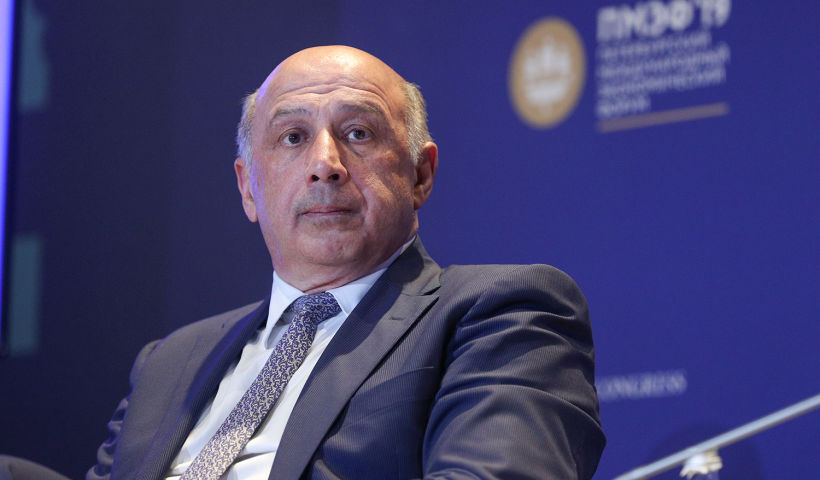- Esteemed Mr Kazbekov, 2020 has become a somewhat new starting point for the entire global economy development. New factors that have emerged from nowhere are now seriously influencing all areas of economy. What do you think about these new factors in terms of the global economy today?
Vladimir Kazbekov: The coronavirus has dealt a major blow to the economies of almost every country in the world. We still have to assess the consequences. Post-COVID-19 economic recovery will take a fairly long time, and, taking the experience of the pandemic into account, the modernisation and development of infrastructure can play an important role in it.
The COVID-19 pandemic has become some kind of a catalyst for the processes in the world economy and international economic relations. The gap between the existing global governance system and its real potential in countering global challenges has become much wider. The pandemic has shown that the struggle against global challenges and threats should be based on the joint efforts of the international community. It is significant that the BRICS countries are working together to counter the common challenges triggered by COVID-19. Following the annual Meeting of the New Development Bank (NDB) Board of Directors last April, BRICS Finance Ministers emphasized in their statement the importance of uniting and jointly countering the coronavirus.
- To what extent has the pandemic changed the directions of the economic development of the BRICS countries?
Vladimir Kazbekov: The coronavirus pandemic has forced adjustments but has not changed the main directions of economic development. The five BRICS countries are still focused on ensuring faster economic growth rates and improving the living standards of their peoples. This goal is prompted by the vital interests of the peoples of Brazil, Russia, India, China and South Africa, which account for over 40 percent of the global population.
- The NDB has been working successfully on projects for several years. But, apparently, the current situation in the BRICS countries had to be taken into account and the Bank’s strategy and tactics had to be adjusted. How serious were these adjustments?
Vladimir Kazbekov: The NDB was one of the first international development institutions to react to the challenges of COVID-19 and provided funds for fighting the new infection. As early as February this year, the NDB expressed its support for the fight against the coronavirus, and in March approved the first loan to finance medical expenses. In April, the BRICS Finance Ministers approved a special programme for special Bank “coronavirus” loans totaling over $10 billion. These loans were designed not only for funding anti-epidemic measures but also for supporting government economic recovery efforts.
At the same time, the NDB continues to actively fund infrastructure investment projects for the sustainable development of all BRICS countries. The portfolio of bank-endorsed projects includes 65 items. The total sum of the loans is $21 billion. This is a tangible addition to the existing capacities of the BRICS states to finance infrastructure projects in their priority areas.
- What economic sectors need the most support from financial institutions today?
Vladimir Kazbekov: Needless to say, support for healthcare is among of our priorities. Like a number of other international development banks, the NDB has quickly come up with the relevant support. China, India, South Africa and Brazil have already received “coronavirus” loans from the Bank amounted to the total of $4 billion. Currently, the NDB is cooperating with the Russian Ministry of Finance to allocate a similar loan to the Russian Federation.
Another important area includes investing in economic growth and employment among the bank’s participants. During the second phase of “coronavirus” loans, which are being prepared now, the bank will provide support for small and medium-sized companies and finance infrastructure projects for sustainable development and measures to encourage employment.
- Has it become more difficult for the Bank to work in Russia?
Vladimir Kazbekov: The NDB has fully adapted to the conditions of the pandemic. We are making broad use of the online formats in our project operations in all BRICS countries, including Russia. Modern cloud IT systems allow us to work on a full scale with clients in all Bank member countries, as well as to attract investment in the international capital markets.
The Eurasian regional office has opened this year, which will allow the NDB to improve its work on drafting and carrying out investment projects in Russia.
We continue expanding the Russian segment of the NDB portfolio. Here is some recent news: three Russian investment projects were approved in September, increasing the Russian share in this portfolio to 13 items. The overall amount of the loans is $3.3 billion. We hope to increase this sum by another $200-300 million by the end of the year.
- 2020 is in the homestretch. 2021 lies ahead. Making predictions today is a thankless task, but can you still say what you expect from the upcoming year? What are the main goals that will guide the Bank in its activities?
Vladimir Kazbekov: Probably, the most expected event of 2021, for the world in general, is a turn in the tide in countering the coronavirus. Mass vaccination could bring this hope closer.
The NDB is primarily guided by the need to conduct productive work for the benefit of its member-countries. Despite the pandemic, the NDB is actively developing “the pipeline” of investment projects in all BRICS countries both in its sovereign and non-sovereign aspects. We hope that by the end of this year the portfolio of approved investments will reach $30 billion.
